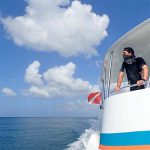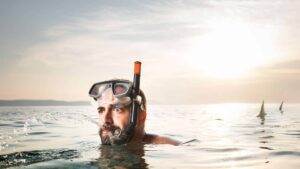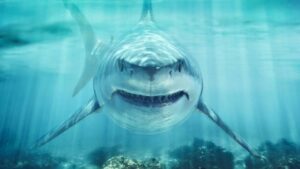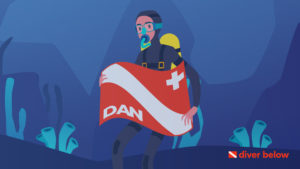Shortly after World War II, a wide interest in skin and SCUBA diving developed in the United States.
Small independent groups of divers sprang up in organized clubs all over the country.
In 1954, a group of YMCA, Red Cross and National Academy of Sciences experts encouraged the Council for National Cooperation in Aquatics to take a look at the safety aspect of this engaging and rapidly growing activity.
Material was outlined with a view toward setting up a course inclusive enough to produce capable performance in those who elect to participate in the recreational activity.
Through the winter of 1954-1955 a test course was directed by Bernard E. Empleton using this outline.
The material used in the course was then published in 1957 under the title The New Science of Skin and SCUBA Diving
The YMCA developed a course of instruction, adopted its own program and certified the first YMCA Skin and SCUBA diving instructors in 1959.
This program was the first nationally organized course in the field. Other organizations soon followed.
In 1970, the sixth National YMCA Aquatic Conference asked the National Board of YMCAs to hire a full-time SCUBA director and establish a national SCUBA headquarters.
This headquarters was established two years later in Atlanta, Ga. under the direction of Ken A. Brock.
The certification of SCUBA divers was made more efficient with computers, and the national headquarters released numerous promotional materials with a national newsletter to all YMCA SCUBA instructors and YMCAs.
In 1976, the National YMCA SCUBA Underwater Activities Program was established in a temporary office in Key West, Florida.
Dedicated on Feb. 18, 1977, the center provided administrative and technical support to the National YMCA Underwater Activities Program, which was expanded broadly in the area of continuing education for recreational Skin and SCUBA divers.
The center also conducted a sophisticated program of research and development and operated an underwater college for YMCA divers and those from other agencies.
YMCA SCUBA recognized the need for a lifesaving course designed for SCUBA divers.
In late 1977, a committee was convened to consolidate the technology for SCUBA Lifesaving and Accident Management (SLAM) into a practical and concise package.
The first book of this type was published in November 1978.
Also in 1978, the first international underwater hockey championships were conducted at the YMCA SCUBA convention in Miami, Fla.
In early 1980, YMCA SCUBA achieved a unique status when the World Underwater Federation (CMAS – Confederation Mondiale Des Activities Subaquatiques) granted equivalency to YMCA SCUBA instructors and divers.
This distinction positioned the YMCA as part of the world’s only diving organization composed of some 12,000 diving clubs, 65 national federations and 3.5 million divers.
On June 30, 1980 the YMCA announced the inauguration of the Bernard E. Empleton Society in order to preserve a living testimonial to the technical contributions and high moral standards exemplified by the life of Bernie Empleton.
Nominations to this honor society preserve a fitting tribute to those who work for the development of the individual in Spirit, Mind, and Body.
The Kenneth C. Gillette, Jr. Memorial Lifesaving Award was announced in 1981.
This award was designed to recognize an outstanding act of heroism in saving or attempting to save the life of a fellow diver or anyone in danger in the water.
The award is made available to all divers throughout the world and is not restricted to YMCA divers or members.
In mid-1985 the YMCA became part of a national committee to develop instructional standards and minimum course content for entry-level SCUBA certification.
On Sept. 1, 1986, the standards were finalized and approved by the major United States certification agencies.
YMCA SCUBA is an active member of the Recreational SCUBA Training Council (RSTC) which is the secretariat to the ANSI SCUBA Instructional Standards.
In May 1990, under the direction of Tom Leaird, Vice Chairman of the SCUBA Advisory Committee, the YMCA conducted the first full-scholarship YMCA instructor course at Ball State University in Muncie, Ind.
Thirty-six candidates, representing 34 YMCAs throughout the United States, were in attendance.
Today, as YMCA SCUBA celebrates its 40th anniversary, we are focusing on our roots.
We are a mission-based program that believes in developing the individual.
YMCA SCUBA works to incorporate SCUBA in YMCAs and other YMCA of the USA program areas across the country.
As a result, we are strengthening our ties with Aquatics, Snorkeling, Skin Diving, families and junior programs.
“Our mission for the next decade is to focus on who we are – the YMCA,” Director Thomas “Tec” Clark said. “And our goal is to build strong divers by remaining a leader in the training and education of divers.”
In the almost 40 years since its inception, YMCA SCUBA continues to provide the highest level of community-oriented education for divers based on the principles of the YMCA triangle: the Spirit, the Mind and the Body.
These principles are the core philosophy of the YMCA, and YMCA SCUBA bases all training and operations on these ideals.




